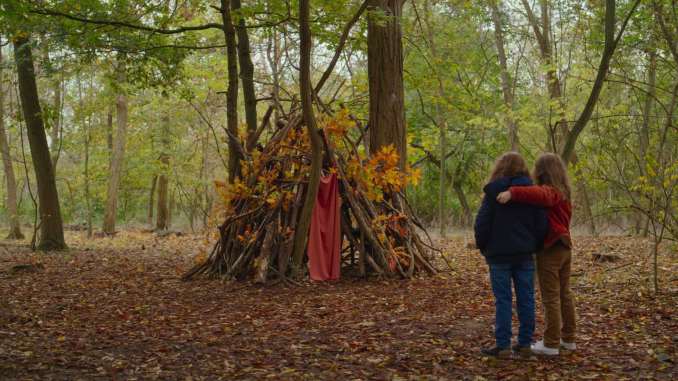Teary Petite Maman Depicts How Past Converses with Present

A year or two ago, I asked my mom whether she feels like her age, or if she feels younger. I told her that I still don’t feel like I’m an adult, that I feel like a teenager disguised as a person in their mid-twenties. I wanted to know if my mom had ever felt this feeling, and if she had, if it ever goes away—if people ever reach a point where they know that they’ve finally, officially stepped into adulthood and shed their adolescence. She admitted that sometimes she does feel like she ought to: Like a woman in her early sixties. But most of the time, in every way that isn’t physical, she still feels like a kid. In Petite Maman, Céline Sciamma’s follow-up to 2019’s Portrait of a Lady on Fire, the French director returns with a much smaller affair by comparison: A compact, 73-minute (yet nonetheless affecting) portrait of grief, parenthood and the constant dialogue between our past and present selves.
Following the death of her maternal grandmother, eight-year-old Nelly (Joséphine Sanz) travels with her parents (Nina Meurisse and Stéphane Varupenne) to her mother’s childhood home. By all accounts, little Nelly seems to get on well with her mother. During the journey from the nursing home, Nelly attentively feeds her grieving parent cheese puffs and apple juice from behind the driver’s seat, then slides her tiny arms around her mother’s neck in an embrace to comfort her as she steers the wheel. But grief is a concept largely foreign to a child wise beyond her years and eager to play pretend as an adult, yet still distant to the reality of death. In the wake of her grandmother’s passing, as her mother clears out her old family things from the house, Nelly laments with more annoyance than anything that she bid a farewell to her relative that wasn’t the right kind of goodbye. She would have given her a better goodbye if she had known it would be her grandmother’s last. “We can’t know,” her mother tells her, and the two of them fall asleep wrapped in each other’s arms.
But when Nelly awakes the next morning, her mother is gone. It’s a discovery less crushingly felt due to an implied absence that Nelly is familiar with. And her spacy yet well-meaning father can’t give Nelly a straight answer as to where her mother has up and left, but he doesn’t seem too concerned about it. The grieving process is something he’s acquainted with, but something he’s reluctant to impart upon a young kid. So, Nelly, an only child, goes off to play in the woods by herself to occupy her time during this confusing interlude. It’s there in the wilderness behind her mother’s old house that Nelly discovers a little girl about her height, about her same hair color and face shape, who lives in a home exactly like the one just beyond the path in the woods where Nelly came from. A little girl named Marion (unsurprisingly, Joséphine’s twin sister, Gabrielle Sanz) who’s building a branch fort in the woods; the same branch fort that Nelly’s mother had once made when she was around Nelly’s age.
-

-

-

-

-

-

-

-

-

-

-

-

-

-

-

-

-

-

-

-

-

-

-

-

-

-

-

-

-

-

-

-

-

-

-

-

-

-

-

-








































